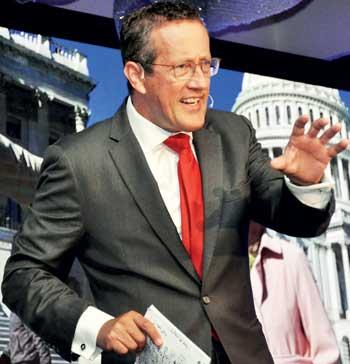Reply To:
Name - Reply Comment
Renowned media figure Richard Quest was recently in the island for the Cinnamon Future of Tourism Summit. Fronting shows like ‘Business Traveller’, ‘’The Express’ and ‘Quest’s World of Wonder’, Quest also anchors ‘Quest Means Business’. The CNN’s business editor at large, Mr. Quest is a well-known media personality world over and has made his mark in the world of journalism.
With an exclusive candid interview with the Daily Mirror, Richard Quest spells out his views on the Sri Lankan tourism industry and shares insight as to how Sri Lanka can get it’s tourism up and running again in the wake of the Easter terrors. According to him, if the tourism sector is to be revived and restored to its former glory, hard decisions have to be made. Excerpts:
 Sri Lankan tourism industry knows what needs to be done
Sri Lankan tourism industry knows what needs to be done
Q How important is it to bring together key stake holders in order to bolster the growth and the stability of the tourism industry in Sri Lanka?
It’s very essential. At the end of the day, the government doesn’t provide the beds, and likewise, the tourism industry doesn’t provide security. There are very legitimate questions as to how things went wrong. I feel it’s entirely justifiable if people want to be assured about the sort of functionality that allowed the sort of events to take place has been repaired or improved. That’s the truth of it. That being said, the magnitude of the problem the government faces with its intelligence services and the sheer incompetence that has led to gaps in the system is undeniable.
 The most important thing to remember is that the private sector has the responsibility of providing the facilities, setting a certain amount of standards as well as promotions, whereas the government facilitates the visa restrictions, standards for hotels etc. It goes without saying that the key stakeholders are interdependent on each other and bringing them together is of utmost importance.
The most important thing to remember is that the private sector has the responsibility of providing the facilities, setting a certain amount of standards as well as promotions, whereas the government facilitates the visa restrictions, standards for hotels etc. It goes without saying that the key stakeholders are interdependent on each other and bringing them together is of utmost importance.
QHow do you think Sri Lanka should opt to implement sustainable development strategies?
I have made an entire career from not giving out advice. I think the risk is this, sustainable development is well known. Every country out there has a vision of what works for them. There is no magic in sustainable development. Sri Lanka has been in the industry for 30 to 40 years and the tourism industry has taken off in the last ten years. Given that Sri Lanka’s quite young in the industry, you have no excuse for not getting it right at the beginning. I think there’s lot to be done here, but if you get it wrong you have nobody to blame but yourself.
QDo you feel that there are different sectors in which the Sri Lankan tourism industry hasn’t capitalized upon yet?
 No. I think they’ve looked at every sector and I personally feel that they are being very mature and very sensible with their approach towards capitalizing on new opportunities. The sector definitely looks for quality over quantity. The tourism industry is very competitive at the moment and I think that’s very good.
No. I think they’ve looked at every sector and I personally feel that they are being very mature and very sensible with their approach towards capitalizing on new opportunities. The sector definitely looks for quality over quantity. The tourism industry is very competitive at the moment and I think that’s very good.
There are various things one needs to consider when it comes to the industry. That’s why it’s important to know that if you’re not careful enough, you’ll kill the goose that lays the golden egg. And I come back to my last answer. There is no reason why you shouldn’t opt for bigger and better things; the Sri Lankan tourism industry knows what needs to be done. There is no doubt that hard decisions have to be made in order for the industry to return to normalcy.
QSri Lankan tourism is heavily depending on social media influencers. Do you think that social media influence is a feasible strategy for the tourism industry in the long run?
No. And that’s not a criticism of the Sri Lankan tourism industry’s use of influencers. The reason I say no is because five years ago they didn’t exist. So when you say in the long run, we don’t know if they will exist. You’ve got bloggers, some are reputable, but the fact that they come and go needs to be kept in mind. Although, I do think it’s a valuable and valid additional tool to an otherwise robust marketing programme. If you’re going to rely solely on the social media influencers, I think you may find it a little difficult. It’s definitely not a feasible marketing strategy in the long run. The influencers definitely add value to the industry, especially to the marketing aspect of it.
Pix by Lasantha Kumara